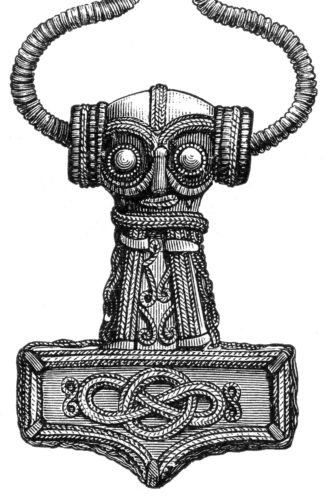UNITED STATES –A U.S. Army soldier has been given the go-ahead to wear a beard as an expression of his Heathen faith, but not everyone in that community is on board. Leaders of some of the higher-profile Heathen organizations have questioned the sources, the messaging, and even the motivations of those who supported the bid.

[pixabay.]
For Sikhs, the issue is that kesh, uncut hair, is a requirement of that religion. However, even the loosening of military beardlessness to accommodate members of that religion does require some cutting; facial hair can’t be allowed to grow more than two inches past the bottom of the chin.
Beards were originally banned to ensure gas masks fit properly since they were first issued a century ago, but Sikhs had a religious exemption in the army. That exemption was eventually eliminated in 1984. The reversal for that group has spurred a wider conversation about allowing beards for all members of the service. As with tattoos, the push to change the rules is coming from service members themselves, according to another Army Times article.
What Heathenry has in common with most modern Pagan and polytheistic religions is the lack of a central human or written authority. Questions of practice are answered by interpreting historical sources, and there’s no consensus on the importance of beards.
The soldier — whose identity was redacted from a copy of the authorizing memo circulated online — is a member of Norskk, as confirmed by Jørgen Kåre Rønning, who responded to an inquiry via email: “We supported the efforts of a member of our organization to be the first soldier in the U.S. Army to obtain a religious accommodation for a Norse Pagan beard.”
Rønning provided a link to information about the beard in Heathen practice, but did not respond to further inquiries. As argued on the Norskk website, “Overall, beards are an essential and fundamental defining features of any Norðmaðr, Víkingr, Heathen, and ultimately, warrior’s identity. The beard is the one characteristic of those who otherwise follow Forn Siðr (old ways). Beards are in fact the true expression of spirituality, masculinity, and what it means to be Heathen. Beards define the Heathen man.”
Male identity is the focus of this group; members can attend camps where they learn everything from shelter building to HALO jumping. Only biological males may attend, and while there are no rules against homosexuality, “feminization” of men is frowned upon, according to the site. Injuries are the sole responsibility of attendees, and disputes are handled through a form of ritual combat, hólmganga, which usually takes place in a part of Russia which is “beyond the reach of modern courts.”
Josh Heath, co-director of the Open Halls Project, said that there won’t be any support for this issue coming from that direction. “If the soldier in question gains something by keeping his beard we wish him well.” However, Heath added that “such requests are frivolous and ultimately negative in the long term for military Heathens. We take this stance because it is not a religious mandate as it for Sikhs, and we won’t support such accommodation requests.”
Heath explained that oaths, including the one of enlistment, are sacred, and take priority if made before one to any gods or lords. “To fly in the face of that oath for the aesthetic of a beard? That runs counter to the core of Heathen theology,” he said.
The two organizations are not in agreement. In fact, membership in the Open Halls Project is grounds for a ban from Norskk, according to information in the latter organization’s rules.
TWH turned to a number of other very public and vocal Heathen organizations, regardless of stance on other socio-political issues with regard to the nature of religious practice, to learn if there was a group in agreement with Norskk or one that required beards as part of membership.

Thor’s Hammer [credit: Olof Sörling.]ru
Typically on the other side of the socio-political divide, Matt Flavel of the Asatru Folk Assembly had this to say: “I am very glad to see the United States military treating Asatru as a serious faith. That being said, the Asatru Folk Assembly does not recognize any such religious imperative requiring Asatruar to wear beards.”
Leaders of the Troth and the new men’s group called Heathen Men United did not respond to requests for comment by press time.
In our interview, Heath of the Open Halls Project raised concerns about the people behind Norskk, a commercial interest through which are marketed training sessions and merchandise such as beard-grooming products. Its executives include Christopher Fragassi-Bjornsen, who in his capacity as chief executive officer for Amaruk Wilderness Company was found liable for religious discrimination in 2014.
Norskk Facebook page administrators were not silent on the public debate, and blasted their co-religionists who disagreed with the beard decision. They said that the “endless references” offered on the organization’s beard page were provided for those who, as they wrote, “demonstrated a level of ignorance [they] never previously experienced, claiming that beards are not a Norse thing.” The administrators refer to those individuals using a term typically intended to convey both feminization and weakness.
Whether or not there’s enough information in Norse lore to support military beards may not actually be an issue within army ranks, given the broader discussions now taking place around allowing beards for all soldiers. It has nevertheless been more than enough to enliven the debate within Heathen circles.
The Wild Hunt is not responsible for links to external content.
To join a conversation on this post:
Visit our The Wild Hunt subreddit! Point your favorite browser to https://www.reddit.com/r/The_Wild_Hunt_News/, then click “JOIN”. Make sure to click the bell, too, to be notified of new articles posted to our subreddit.